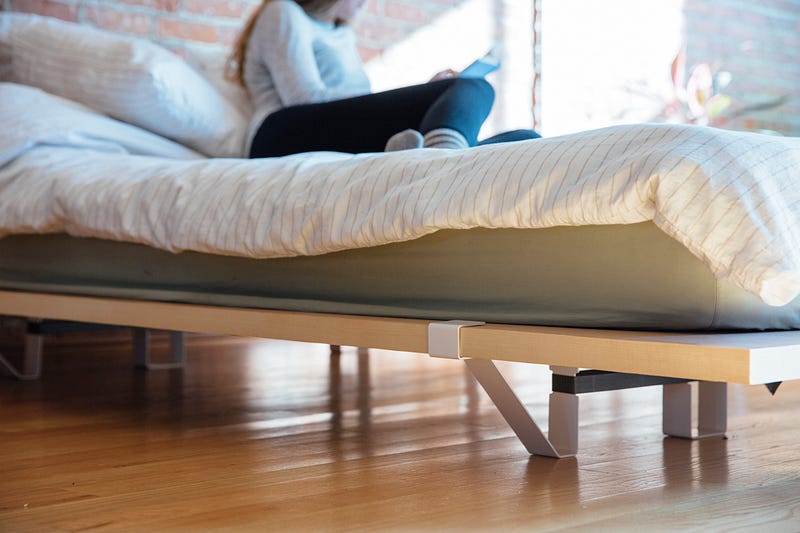Detroit Upstart Floyd Wants to Change How We Furnish Our Homes
Enter Floyd. Alex O'Dell and Kyle Hoff, the founders of Floyd, met in Detroit shortly after moving to the city in 2014. Here they teamed up with a mutual friend to transform an old auto garage into a place-based incubator in the city’s Corktown neighborhood.
And so Floyd was conceived.
Floyd, which started as an Ikea-alternative furniture source, did some research and found that the average millennial stays in an apartment for nine to 12 months, before moving again. For the two founders, this was the key in understanding the urgent need for furniture adapted for the city. "We saw an absence in addressing a clear pinch-point for millennials living in cities—after all, furniture is difficult to buy, assemble, and move," says Hoff (now Floyd’s CEO).
"We both felt that the furniture industry as a whole had failed to adapt to the changing needs of people living in cities," says Hoff. "If anyone has spent their Saturday traveling out to an Ikea in the suburbs; you know what I’m talking about." And at first, capital was what fueled the company—with a Kickstarter campaign that brought in 14 times their initial goal from over 30 countries. Next up was their focus on the perfect product offering that works seamlessly with the Internet and doesn’t cost an arm or a leg. Their devotees were hungry for more.

Floyd’s intention is to involve you, the design and furniture lover, in the process as an active, gung-ho participant. For instance, as Hoff points out, "for the table, we reduced a table down to its essential parts—you receive four table legs, which gives you the ability to construct a beautiful table in a few minutes from any surface material. This ranges from a desk, to a dining table and to a coffee table." As for a bed frame, the options are to just receive a framework (filled by your imagination and design fantasies) or the platform panels for a more complete solution. But what Floyd holds as a sort of trump card, is the simplicity of it all—no fight-inducing instruction manuals, which require "language" proficiency and also, no tools necessary.
Floyd’s platform bed, which is made of wooden panels that the company says are "lighter than plywood."
And then came the feedback: Customers from all over the world were, proudly, sending photos of their versions of Floyd furniture. In fact, over 30 percent of their sales are international; their biggest markets outside the U.S. are Japan, Australia, and Europe. "We could see that the brand was able to organically resonate across cultures," Hoff explains. "After all, a big priority for us was to lower the purchase barrier." And so, with a market centered in dense urban areas, the next phase will be launching a few more key products and, as before, with an easy purchase experience.
But the city of Detroit forms a big part of the Floyd tale. "Motor City," known for its manufacturing, is more recently recognized for its demise and then its slow and steady rise. "We work closely with large-scale factories in the Great Lakes Region to produce our furniture," says Hoff. "Many of our manufacturers (some who have never produced furniture before) are multiple-generation, family-owned entities. And for us, we love being no more than a few hours drive from our furthest manufacturer." Detroit, with its tacit knowledge base built up over many decades, has a deep level of expertise ranging across the manufacturing spectrum, and according to Hoff, that extent of expertise is difficult to find elsewhere.

Traditional furniture companies, and even the new age highly affordable ones, are often predicated on a model of releasing huge amounts of products to keep up with "what’s hot." This, according to Hoff, leads to a convoluted offering and, worst of all, a confusing shopping experience. "We want our next steps to be purposeful and continue to keep our line focused on a minimal set of strong products," Hoff smiles. "We’re taking our time and we’re just not in any rush."
original post: detroit-furniture-modular-diy
/cdn0.vox-cdn.com/uploads/chorus_asset/file/6812575/The%20Floyd%20Utility%20Set%20%E2%80%94%20create%20a%20desk%20or%20dining%20table%20from%20any%20surface%20material%20(1).jpg)
/cdn0.vox-cdn.com/uploads/chorus_asset/file/6812679/8.jpg)


Comments
Post a Comment